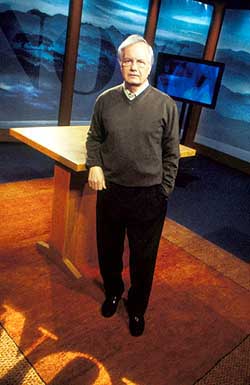
Unlike some journalists who say that their kind ought not even vote if it means keeping the public's trust (yeah, right), Moyers said he was liberal. He talked frankly of being angered by how the renewal of civic values in the wake of Sept. 11 had been plundered by what he calls "wartime opportunists," like lobbyists and lawyers.
For public television's Bill Moyers, a fight to the finish
By Ken Parish Perkins
Star-Telegram Staff Writer
How fitting that Bill Moyers goes out swinging, slapping back the hand that has long tried to unhinge him. Moyers, 70, is a favorite whipping boy of conservative thinkers who consider his politics too left-field, and his weekly PBS series, Now, damaging to the truth, justice and the new American way of partisan journalism.
Tonight's final installment of the soul-searching Now, with Moyers at the helm, steps proudly and gleefully into the lion's den and goes directly for the throat. He delves into what role right-wing media play as a kind of partisan propaganda arm, dutifully serving the Republican National Committee.
You gotta chuckle at the thought, of the brashness, of the nerve. Who else would, or could, say that? Certainly not Dan Rather on CBS, or any other commercial network mouthpiece taking marching orders from corporate raiders feeding from the bottom line.
As usual, Moyers is on his own. It's a kind of journalistic isolation to which he has become accustomed.
For a number of years now, word that right-wing groups have pressured the ever-so-vulnerable Public Broadcasting System to push Moyers out the door, or a window, has circulated with various degrees of seriousness. And for just as long it has been denied by both Moyers, a former press secretary to President Lyndon B. Johnson, and PBS, long considered the bluest of blue media "states."
Who knows the truth there? PBS President Pat Mitchell, the champion of trying to "balance" at least the perception that PBS itself isn't a partisan propaganda arm serving the Democratic National Committee (and doing it poorly), wants to be liked by everyone -- if only to prevent PBS' revenue streams from drying up.
The hiring of Tucker Carlson and a few other subtle and not-so-subtle moves were designed to prove that Public Broadcasting is bipartisan, that it has conservative voices in bow ties. Dumping Moyers (Now will continue under co-host David Brancaccio) would be akin to the ultimate under-the-table, back-scratching deal.
Moyers dabbled in commercial TV for CBS, but he's no fool. He knew his true calling was the truly independent voice of Public Broadcasting, where he led exhaustive reporting on the things that got under the skin, and grew there, like a rash.
He wanted to use Now, which he began in 2002, as a CSI-like news magazine, using high-tech, razor-sharp reporting to gather and lay bare the issues that his media colleagues wouldn't dare touch. Follow the money. Follow the lies. Now's first broadcast put the White House on red alert with a scathing report on the secret meetings Vice President Dick Cheney had with a host of energy and oil company officials.
Now was off and running, tackling civil liberties violations, the illegal sale of assault weapons, corporate accountability, women's reproductive rights, secrecy in government, the vulnerability of chemical facilities to terrorist attacks, global public health, the environment.
One story last February broke the details of a Justice Department draft of a bill designed to extend the powers of the Patriot Act. Weeks later, Now revealed how, during the war in Afghanistan, the American government authorized the evacuation to Pakistan of thousands of surrounded enemy troops, including members of the Taliban and al Qaeda.
Perhaps Now's most impressive achievement remains its persistent coverage of the Federal Communications Commission's (chairman Michael Powell jokes of Moyers being "a pit bull") attempt to relax the rule governing media ownership -- a story media outlets, for obvious reasons, tend to ignore. When the FCC held a rare public hearing in New York City, in the back yard of network newsrooms, Now was the only TV news team there.
Born in Oklahoma -- though Texas claims him for his early roots in Marshall and his stints at North Texas State University, the University of Texas at Austin and Southwestern Baptist Theological Seminary -- Moyers never quite achieved the legendary status of a Walter Cronkite or David Brinkley, or, for that matter, the household-name-ness of a Brokaw, Rather or Jennings. (There's certainly less of an earth-shattering buildup to his departure than to Brokaw's.)
Moyers nevertheless had quite the colorful career(s): deputy director of the Peace Corps in the Kennedy administration, publisher of Newsday, president of the Schumann Center for Media and Democracy, Baptist seminarian, and author of books such as Healing and the Mind and Fooling With Words: A Celebration of Poets and Their Craft.
Unlike some journalists who say that their kind ought not even vote if it means keeping the public's trust (yeah, right), Moyers said he was liberal. He talked frankly of being angered by how the renewal of civic values in the wake of Sept. 11 had been plundered by what he calls "wartime opportunists," like lobbyists and lawyers.
Now Moyers departs with a mess left behind, even at PBS, which he says has become too politicized for its own good.
Ask him where you'll find truth-telling media these days and he'll probably say (with a straight face) Jon Stewart, who uses his Daily Show to cut through the clutter without worrying about reprisals. Stewart sits there atop the conservatives' liberal hit list with Moyers, and filmmaker Michael Moore, who says of the current state of looking for political truth, "There's Jon Stewart and Bill Moyers. Everything else is a sugar-coated lie."
Ken Parish Perkins, (817) 390-7862 kperkins@star-telegram.com








